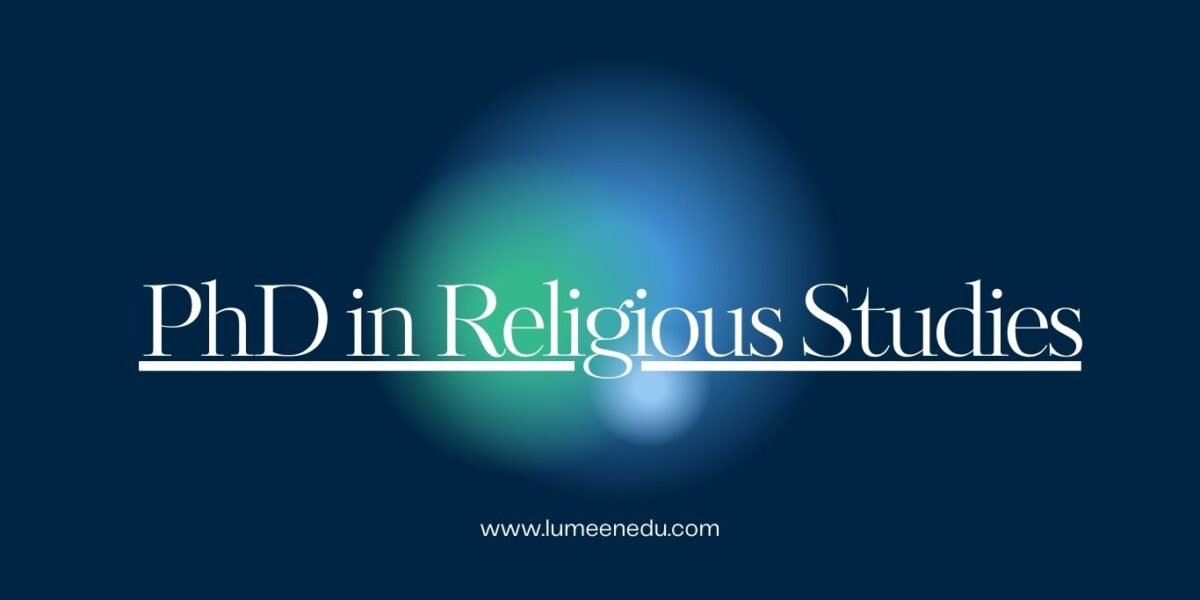Pursue a PhD in Religious Studies and Expand Your Horizons
A PhD in Religious Studies is an advanced academic program meant for people who are interested in delving deeply into religious traditions, ideologies, and civilizations. This degree provides a unique chance to do interdisciplinary study, critically examine spiritual occurrences, and make substantial contributions to the academic and practical understanding of religion in modern culture.
Program Structure of Phd in Religious Studies
Pursuing a PhD in Religious Studies is an intellectually stimulating experience that provides academics with the resources to:
- Engage in Advanced Research: Investigate complicated problems about religious beliefs, practices, and their social implications.
- Study religion using an interdisciplinary approach that draws on concepts from history, anthropology, sociology, philosophy, and theology.
- Global Perspective: Learn about different religious traditions and how they influence cultural and political environments.
- Career Opportunities: Train for positions in academia, research, public policy, and interfaith dialogue.
Program Structure of PhD in Religious Studies in India
The PhD in Religious Studies curriculum normally lasts three to six years and contains the following components:
- Coursework includes foundational courses on techniques, philosophies, and religious traditions.
- Comprehensive exams assess a scholar’s knowledge and preparedness for dissertation work.
- Dissertation: Original study that adds fresh insights to the subject of religious studies.
- Teaching Experience: The opportunity to teach undergraduate courses and get academic experience.
The curriculum is rigorous and geared to help scholars develop competence in their chosen area of specialty.
Eligibility Criteria for a PhD in Religious Studies
To apply for a PhD in Religious Studies, prospective applicants must complete the following qualifying requirements:
- Educational Qualifications:
- A Master’s degree in Religious Studies or a related discipline (such as Philosophy, History, or Anthropology) from an accredited university.
- Candidates with strong undergraduate academic performance may also be selected for various programs.
- Language Proficiency:
- English proficiency (foreign applicants should have TOEFL/IELTS results).
- Depending on the field of study, knowledge of classical languages such as Latin, Greek, Sanskrit, and Arabic may be necessary.
- Research Proposal:
- A well-written research proposal that details the proposed field of study and its relevance.
- Letters of Recommendation:
- Strong academic references demonstrating the applicant’s research ability and intellectual capacity.
- Entrance Examination and Interview:
- Some institutions may require candidates to pass an entrance exam or attend an interview as part of their selection process.
Specializations in a PhD in Religious Studies
A PhD in Religious Studies allows scholars to specialize in areas such as:
- Comparative Religion
- Philosophy of Religion
- Theology and Ethics
- Religious History and Culture
- Interfaith and Interreligious Studies
- Sociology and Anthropology of Religion
- Sacred Texts and Translation Studies
These specialties offer a personalized academic experience based on the scholar’s interests and professional goals.
Career Opportunities Post PhD in Religious Studies
Graduates with a PhD in Religious Studies have varied professional options, including:
- Academics: Teach and do research in universities and colleges.
- Publishing: Create and edit scholarly publications, journals, and books.
- Nonprofit groups: Participate in interfaith groups and cultural preservation activities.
- Public Policy: Provide advice to governments and organizations on religious issues and community participation.
- Contribute to documentaries, journalism, and public religious education.
A PhD in Religious Studies provides in-depth information and analytical abilities that are helpful in various areas.
How to Apply
If you’re ready to begin on a transforming journey with a PhD in Religious Studies, here’s how to get started:
- Investigate the universities providing the program and their unique prerequisites.
- Create a good research proposal based on your academic interests.
- Gather the appropriate documentation, such as transcripts, language proficiency scores, and recommendations.
- Submit your application before the deadline and prepare for interviews or entrance examinations, if necessary.
A PhD in Religious Studies is more than just an academic endeavor; it leads to a better understanding of the spiritual and cultural influences that form our world. Whether you want to be an academic, a thought leader, or a cultural mediator, this program will equip you with the information and skills you need to make a difference. Begin your journey now and add to the rich tapestry of Religious Studies.
Discover the possibilities and begin your application for a PhD in Religious Studies now!

